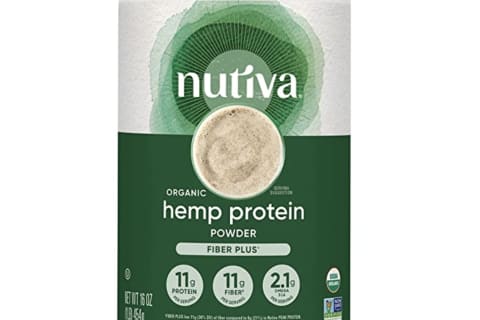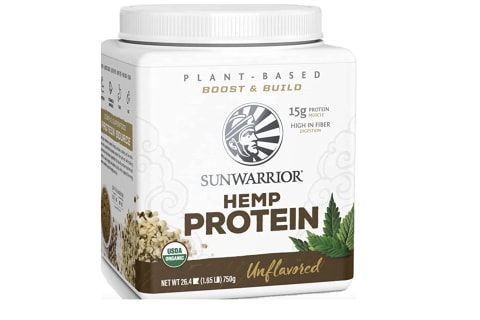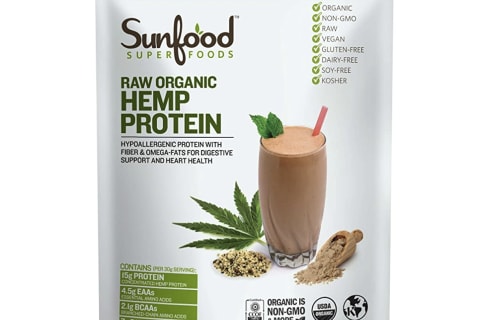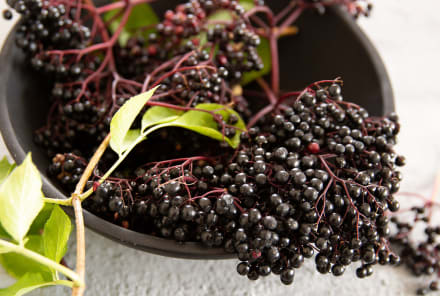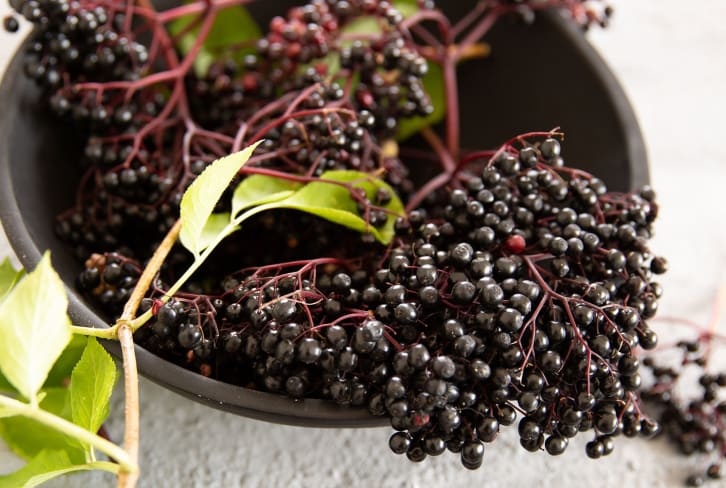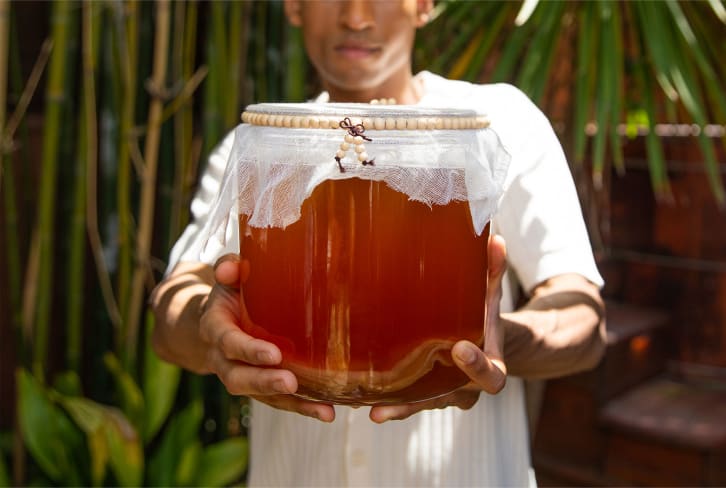Advertisement
Hemp Protein 101: Pros, Cons, Shopping Tips & Healthy Ways To Use It


Hemp protein powder is a vegan protein supplement that has become increasingly popular among athletes, fitness enthusiasts, and those looking to meet their protein needs due to its many health and sustainability benefits.
We spoke to dietitians and explored the pros and cons to help you decide if supplementing with hemp protein powder is right for you.
What is hemp protein?
As the name suggests, hemp protein powder is derived from the seeds of the hemp plant.
The hemp plant, or Cannabis sativa, is grown specifically for industrial purposes, such as making textiles, paper, building materials, and food products like hemp-derived CBD, salad dressings, cereal, and margarine.
Hemp protein powder is made by extracting the oil from whole hemp seeds and grinding the remaining seed meal into a fine powder. The final product contains all nine essential amino acids, beneficial minerals, omega-3 and omega-6 fatty acids, and is an excellent source of fiber. It has a nutty flavor and a slightly grainy texture.
Since hemp protein powder doesn't provide enough of the amino acid lysine, many experts do not consider it a complete protein. Regardless, it's still a high-quality plant-based protein and a popular alternative to other vegan protein powders such as soy, pea, and rice.
Hemp contains low levels of delta-9-tetrahydrocannabinol (THC), the psychoactive compound found in marijuana. But the levels of THC in hemp are so low that they cannot produce intoxicating effects or cause a "high."
The research on hemp protein powder is limited compared to other protein powders like whey and pea, potentially because hemp used to be wrongly lumped together with marijuana.
Summary
Benefits of hemp protein
Hemp protein powder is a rich source of essential nutrients that may offer numerous health benefits when consumed as part of a balanced diet.
But it's important to note that most of the human studies that show the potential health benefits of hemp are linked to hemp seed oil or hemp-derived CBD, not hemp protein isolate, so more research is needed.
It is high in protein.
Hemp protein powder is a good source of plant-based protein, which is essential for building and repairing muscle tissue.
A 31-gram serving1 of hemp protein powder contains around 12 grams of protein, depending on the brand you choose.
Soy, pea, and whey protein powders all have more protein per serving than hemp, but they won't provide all the same nutrients as hemp protein powder.
While a serving of hemp protein powder doesn't contain the 10 grams of essential amino acids2 and 2 to 3 grams3 of leucine to trigger muscle protein synthesis, a plant protein blend that includes hemp protein powder can easily help you hit these targets.
It may improve body composition.
Consuming adequate amounts of protein as part of a balanced diet, in combination with resistance exercise training4, can help support muscle growth and maintain lean body mass. A protein powder supplement, like hemp, can fill protein gaps in your diet to achieve this.
"The research focusing on whether or not protein powders can help decrease fat mass5 still has mixed reviews. Most of the studies have focused on whey-based protein powders and men in particular, so there is still a lot to learn," notes Brittany DeLaurentis, MPH, R.D., CSO, L.D., founder of Brittany Lynn Nutrition.
However, due to its high fiber content, hemp protein powder in particular may help to reduce appetite6 and promote feelings of fullness. This can be beneficial for weight management and maintaining a healthy body composition.
While it depends on the product, a 31-gram serving1 of hemp protein powder contains about 11 grams of fiber. This is about one-third of the daily recommended fiber intake for adults.
It may help to prevent cardiovascular disease.
These essential fatty acids also help to maintain brain function10.
Because hemp protein powder can be up to 10% fatty acids by weight (and has a high fiber content), it's not considered a pure protein supplement like milk-based protein powders. Most whey protein powders will have little fat and no dietary fiber.
Hemp protein powder also contains magnesium which supports muscle function (your heart is a muscle). Magnesium deficiency can increase your risk of heart disease11 and high blood pressure.
It may help with constipation.
Chronic constipation affects up to 20% of adults12 in North America, and the most recommended therapy is increasing fiber intake either through diet or supplements.
Since hemp protein powder is an excellent source of dietary fiber, it likely helps improve digestion and prevent constipation. One study done on hemp seed pills found that they reduced constipation severity and straining13 compared with a placebo.
Just be careful not to increase your fiber intake too quickly, notes Nichole Dandrea-Russert, M.S., RDN, author of The Fiber Effect.
"Since more than 95% of the American population does not consume enough dietary fiber, there is a chance that excess hemp protein powder could result in a quick jump in dietary fiber intake, which could lead to gastrointestinal issues, like bloating and gas," Dandrea-Russert explains. "Therefore, if the fiber in hemp is new to you or if you consume little fiber, in general, you may want to start with half a serving in addition to drinking plenty of water."
It is easily digested.
Although animal proteins are generally more easily digested than plant proteins, evidence suggests14 that hemp proteins have protein digestibility scores equal to or greater than other grains, nuts, and pulses.
"While some research points to hemp protein powder being low in lysine15, one of the essential amino acids, research also shows that hemp protein is highly digestible with over 90% of the protein absorbed," adds Dandrea-Russert. "Lysine can easily be obtained from other plant sources, such as tofu, tempeh, beans, chickpeas, lentils, pumpkin seeds, and pistachios, to name a few."
It is highly sustainable.
Hemp production is one of the world's most sustainable industries, and the applications for hemp16 are growing daily. The National Industrial Hemp Council of America estimates that hemp can make more than 25,000 products.
Every part of the plant can be used: the stalk for textiles and paper, the pulp from the leaves for building materials, the seeds for seed oils used in foods, industrial products, and personal hygiene products, and the seeds for eating.
"Eco-conscious individuals may benefit from consuming hemp protein over whey protein given that hemp protein is a plant source which uses less natural resources, including significantly less water17 to grow," says Dandrea-Russert.
Among the many sustainability benefits of hemp18, the plant is effective at removing carbon dioxide from the environment, preventing soil erosion, and contributing to biodiversity.
Hemp protein vs. other protein powders
Hemp vs. pea protein
Hemp and pea protein powder are popular plant-based protein powders but differ in nutrition profiles, taste, and digestibility.
"Pea protein is extracted from yellow peas and ranges in protein from 20 to 27 grams per serving, depending on the brand. Therefore, it may be slightly higher in protein per serving compared to hemp protein powder," says Dandrea-Russert. "However, pea protein has much less fiber than hemp protein, with 0 to 1 gram of fiber per serving. Similar to hemp protein, pea protein is an excellent source of iron."
Pea protein is also high in branched-chain amino acids (BCAAs), which are essential for muscle growth and recovery19.
Pea protein powder is generally considered to be milder and less gritty than hemp protein powder, which can have a slightly nutty and grainy flavor.
Both hemp and pea protein powder are highly digestible and easy on the stomach. But some people may experience digestive discomfort with either of them due to individual sensitivities.
Summary
Hemp vs. whey protein
Whey protein powder is derived from milk and is a popular choice for athletes because it is a fast-digesting protein rich in essential amino acids and enough leucine to trigger muscle protein synthesis.
"You need a lot more hemp protein to get the same amount of essential amino acids in pea protein and even more if you want to match whey protein," says sports dietitian and author Marie Spano, M.S., R.D., CSCS, CSSD. "In fact, to get the same amount of essential amino acids as in 25 grams of whey protein, you need close to 50 grams of hemp protein."
Whey protein powder also tends to be more palatable than hemp protein powder. It is typically smooth and creamy compared to hemp protein powder's earthy flavor and gritty texture.
"While whey protein has approximately 30 grams of protein per serving, depending on the brand, it also may come with saturated fat (hemp has zero saturated fat), zero fiber, and little to no iron," says Dandrea-Russert.
Summary
Who should take it?
Hemp protein powder is a good source of protein, fiber, healthy fats, and minerals that can provide a range of health benefits for various people, including vegans and vegetarians, athletes and fitness enthusiasts, people with food allergies or intolerances, or anyone looking to fill gaps to meet their protein needs while adding more nutrients to their diet.
The recommended dietary allowance (RDA) for protein for the average sedentary adult is a conservative 0.8 gram per kilogram of body weight per day (g/kg/d). However, this can increase for athletes and individuals engaging in intense physical activity. Most active people should consume at least 100 grams of protein per day for optimal health.
"We find from a metabolic standpoint, working predominantly with women, that if they get below 100 grams per day, they lose most of the benefits of protein: fatty acid metabolism, insulin sensitivity, weight loss, satiety," leading amino acid and protein researcher Don Layman, Ph.D., previously explained on the mindbodygreen podcast.
Hemp protein powder, like any other supplement, is meant to supplement a well-balanced diet and should not make up the bulk of your protein intake.
Summary
How to find a good option
If you want to boost your protein and fiber intake for general health and well-being, an organic, raw hemp protein powder with minimal ingredients can be a great option.
If you're an athlete or fitness enthusiast interested in optimizing muscle protein synthesis, a plant-based blend containing hemp might make more sense for you to get the essential amino acids in the amounts necessary to build muscle.
Look for 25 to 30 grams of protein per serving with a complete EAA profile.
mbg's picks for clean hemp protein powders
When & how to eat it
Hemp protein powder can be used in various ways, making it easy to incorporate into your daily diet. Here are a few suggestions:
- When combined with resistance training, eating high-quality protein every three to four hours20 can improve body composition and performance. A serving of hemp protein powder or plant blend containing hemp can help you distribute your protein 21intake21 throughout the day.
- Add hemp protein powder to a smoothie with fruits and vegetables for a nutritious and filling breakfast.
- Replace some of the flour in your recipes with hemp protein powder to add extra protein to your baked goods like muffins, pancakes, and bread.
- Mix hemp protein powder with nuts, seeds, and dried fruit to make homemade protein bars or protein truffle balls for a quick and easy snack on the go.
- Use hemp protein powder as a topping for oatmeal or yogurt to boost the protein and fiber content and to help you feel fuller for longer.
- Add hemp protein powder to savory dishes such as soups, stews, and casseroles as a thickener or flavor enhancer.
- Whip up a post-workout shake with a 2:1 or 3:1 ratio of carbs to protein for an effective recovery strategy.
Side effects & risks of too much protein
While there aren't any real risks to hemp protein powder, there could be some unpleasant side effects like bloating and gas if you're not used to eating a lot of fiber.
"If you are generally healthy, there are no adverse health effects from consuming protein powder," says Spano. "However, some individuals may need to avoid protein powder or avoid certain types of protein powder depending on their medical nutrition needs.""
In people with preexisting kidney problems, consuming high amounts of protein powder can put excess strain on the kidneys, which may lead to kidney damage.
Consuming excess calories from protein powder, like any other food, can lead to weight gain if you exceed your daily caloric needs.
FAQ
What is hemp protein good for?
Hemp protein powder is a high-quality plant-based protein source that can help build and repair muscle tissue, support digestion and promote feelings of fullness due to its high fiber content, and provide beneficial nutrients such as omega-3 and omega-6 fatty acids. It is a great option for vegetarians, vegans, and anyone looking to increase their plant-based protein and fiber intake.
Is hemp protein better than whey protein?
Both types of protein offer unique benefits and drawbacks, and the choice ultimately depends on your preferences, dietary needs, and fitness goals. Whey provides more protein per serving and a complete amino acid profile for muscle protein synthesis. In contrast, hemp provides beneficial nutrients like fiber, healthy fats, and minerals you won't find in whey protein powder.
How do you use hemp protein powder?
Hemp protein powder can be added to smoothies, shakes, and yogurt or be used as a baking ingredient, such as in protein bars or pancakes. It can also be mixed with water or plant-based milk as a protein drink.
The takeaway
Hemp protein powder can help you hit your daily protein targets, but unlike some other protein powders, it's a sustainable nutrition powerhouse that provides fiber, essential fatty acids, and minerals that may provide additional health benefits.
21 Sources
- https://fdc.nal.usda.gov/fdc-app.html#/food-details/2339273/nutrients
- https://www.ncbi.nlm.nih.gov/pmc/articles/PMC7469068/
- https://www.frontiersin.org/articles/10.3389/fnut.2021.685165/full
- https://www.ncbi.nlm.nih.gov/pmc/articles/PMC5852756/
- https://www.ncbi.nlm.nih.gov/pmc/articles/PMC6566799/
- https://pubmed.ncbi.nlm.nih.gov/33493023/
- https://pubmed.ncbi.nlm.nih.gov/34505026/
- https://pubmed.ncbi.nlm.nih.gov/30971107/
- https://pubmed.ncbi.nlm.nih.gov/30019767/
- https://pubmed.ncbi.nlm.nih.gov/36381743/
- https://www.ncbi.nlm.nih.gov/pmc/articles/PMC5852744/
- https://pubmed.ncbi.nlm.nih.gov/32324606/
- https://www.ncbi.nlm.nih.gov/pmc/articles/PMC4015201/
- https://pubmed.ncbi.nlm.nih.gov/20977230/
- https://pubmed.ncbi.nlm.nih.gov/17090145/
- https://pubmed.ncbi.nlm.nih.gov/35146149/
- https://www.ncbi.nlm.nih.gov/pmc/articles/PMC9913960/
- https://pubmed.ncbi.nlm.nih.gov/36766179/
- https://pubmed.ncbi.nlm.nih.gov/25628520/
- https://pubmed.ncbi.nlm.nih.gov/28919842/
- https://pubmed.ncbi.nlm.nih.gov/32321161/
Watch Next
Enjoy some of our favorite clips from classes
Enjoy some of our favorite clips from classes
What Is Meditation?
Mindfulness/Spirituality | Light Watkins
Box Breathing
Mindfulness/Spirituality | Gwen Dittmar
What Breathwork Can Address
Mindfulness/Spirituality | Gwen Dittmar
The 8 Limbs of Yoga - What is Asana?
Yoga | Caley Alyssa
Two Standing Postures to Open Up Tight Hips
Yoga | Caley Alyssa
How Plants Can Optimize Athletic Performance
Nutrition | Rich Roll
What to Eat Before a Workout
Nutrition | Rich Roll
How Ayurveda Helps Us Navigate Modern Life
Nutrition | Sahara Rose
Messages About Love & Relationships
Love & Relationships | Esther Perel
Love Languages
Love & Relationships | Esther Perel
What Is Meditation?
Box Breathing
What Breathwork Can Address
The 8 Limbs of Yoga - What is Asana?
Two Standing Postures to Open Up Tight Hips
How Plants Can Optimize Athletic Performance
What to Eat Before a Workout
How Ayurveda Helps Us Navigate Modern Life
Messages About Love & Relationships
Love Languages
Advertisement

How To Use Food To Recover From Autoimmunity: An MD's Top 4 Tips
Sara Szal Gottfried, M.D.
